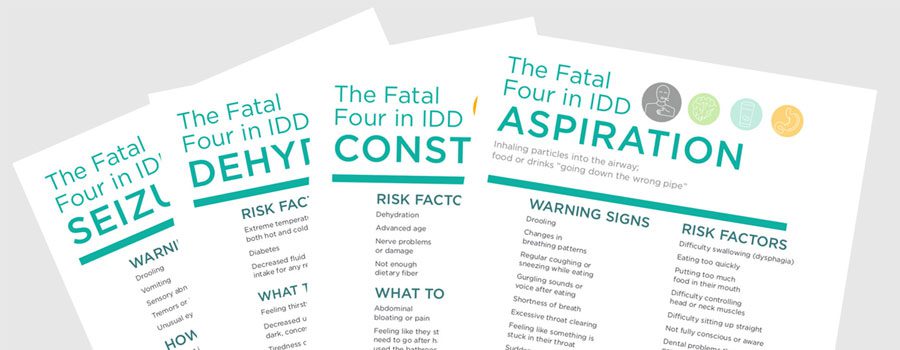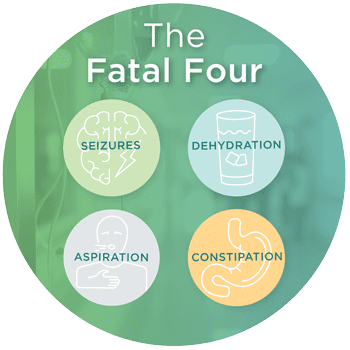WHAT ARE THE FATAL FOUR IN IDD?
There are four major health issues that are commonly linked to preventable death in individuals with intellectual and developmental disabilities (IDD) residing in congregate or in community-based settings. These health issues, commonly referred to as “The Fatal Four,” are aspiration, dehydration, constipation and seizures. As more individuals with IDD move into community settings, direct support professionals (DSPs) need to be familiar with these common medical conditions.
Treatment and management of healthcare needs among patients with IDD can be challenging. Individuals with IDD have unique needs that are not always consistent with those of the general population. Additionally, many of these individuals cannot verbalize symptoms, and behaviors may mask the signs of life-threatening conditions. Therefore, all DSPs, qualified intellectual disability professionals (QIDPs), and registered nurses supporting people with IDD must have an in-depth knowledge of the Fatal Four causes, symptoms and treatments.
RESOURCES


Fatal Four Posters [Free Download]
Relias created these posters on The Fatal Four to help you educate your employees and protect the people you serve. Print out these posters on legal-sized paper, hang them in your offices and facilities, and save lives.
Download the postersThe Fatal Four and Other Health Hazards
This webinar reviews common health emergencies and chronic health conditions that can rob a person with developmental disabilities of their health and life.
Learn MoreThe Fatal Four
This course covers common health problems for people with IDD, including dehydration, UTIs, constipation, and aspiration.
Learn MoreCOMMON QUESTIONS ABOUT THE FATAL FOUR IN IDD
-
What are the Fatal Four?
Dehydration, constipation, aspiration and seizures make up the Fatal Four.
-
What increases the risk of aspiration?
Difficulty swallowing, difficulty sitting up straight, and eating too quickly are just a few of the risk factors for aspiration. Read more
-
Why are persons with IDD prone to dehydration?
Many people with IDD experience disruptions in their body’s senses and signals. These individuals might not know they are thirsty. Others may have difficulty communicating thirst or may be unable to get a drink on their own when they need one. Read more
-
How can DSPs prevent constipation among the individuals they support?
Direct support professionals (DSPs) should use these 9 tips to help reduce the risk for constipation among the individuals they support, including watching sodium intake, integrating physical activity into the day, and encouraging a well-balanced diet. Read about all 9 ways
-
What should a DSP do to support someone who has seizures?
There are 10 ways DSPs can help to prevent seizures or injuries that can occur during a seizure. These include providing medication support and encouraging the individual to take showers. Read all 10 ways







